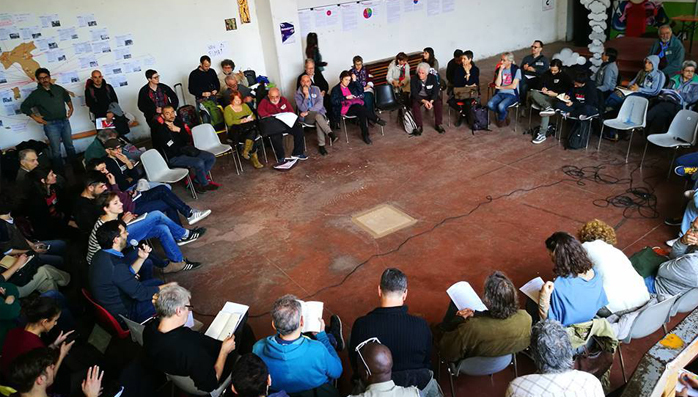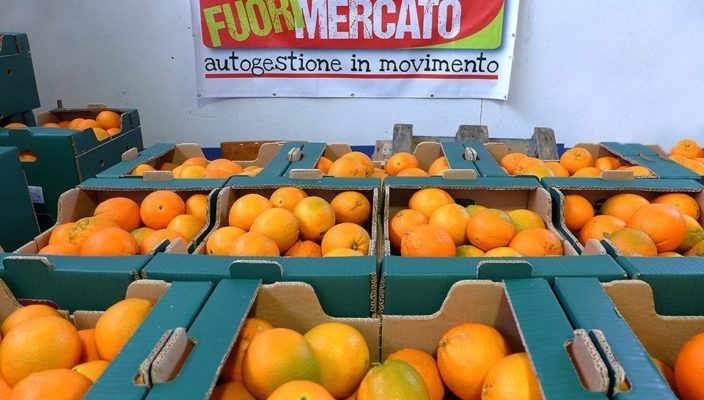
In view of the European meeting of recovered factories and mutual societies, to be held in RiMaflow between next 12 and 14 April, we propose, in Italian and in English, a text on conflicting mutualism whose drafting was shared among all the realities that wanted to participate. The ambition is that this manifesto will concretely become a plural but common mobilization tool with which to face the challenges of the new phase. (The conference working group).
1. During the militant meeting on “Mutualism. Practices, conflicts, self-management”, held at the Social Centre Scup in Rome (Italy) on 7-8 April 2018, we proposed to open a broad debate on the experiences of self-management and on the statuses of commons and civic uses, with the aim of starting a process of collective writing of a "Mutualism and Self-management Manifesto". We are determined to claim the right to exist and to grow for self-managed, mutualistic and cooperative experiences, enterprises and activities, making full use of the current legislation but also exceeding it and hinting at more advanced juridical codifications. Our first references are the Italian Constitution and the codifications as they were elaborated at the local level, for example the Declaration of civic use of the occupied farm Mondeggi Bene Comune, close to Florence.
2. The preliminary condition for a social transformation project to regain credibility is the solidaristic and mutualistic "do-it-yourself" aspect, "act-by-yourself"in the sense of do it togheter This is the starting point of our conception ofmutualism and of our practices: we consider them as resources through which we can resist and fight the management of our planet dominated by the market, the capital, the logic of exploitation, the robbery of common resources, the patriarchal violence against women. Most of all, "Act by yourself" means to give back a practical sense to the word “solidarity”, a word that we imagine as a strong concept, heir of a strong thought..
3. Our idea of mutualism does not imply that the practice of solidarity is limited to the social figures that decide to associate. Rather, it aims to conquer rights, to claim needs, to bet on the new world that is not yet there. It is a conflictive mutualism that does not accept to be considered as a lenitive of social suffering. In particular, it should not be associated with a process of welfare state dismantling. We consider our view of Mutualism as antidote to such processes and as a tool to strengthen new forms of public service, guaranteed to everyone and manageable by everyone.
4. Therefore, conflictive mutualism aims to be an instrument of mobilization, of organization of conflict as well. It aims to obtain concrete achievements: work, income, land, social rights should be practised with the aim of being codified as durable achievements. The instruments of mutualism are self-management instruments, which are helpful to achieve wider and more general objectives. For these reasons a mutualism project has a general program and it is not limited to philanthropy that is wedged in the voids produced by the process of capitalist accumulation. It claims a minimum legal wage, the right to a new welfare, that should be common, self-managed, shaped on the new social needs, open, inclusive, pervasive and widespread. It emphasizes its own multi-ethnic and multicultural character, based on the freedom of movement and as well as on universal citizenship. It emphasizes its being feminist, on the one hand, because it recognizes the value of female labour; on the other, because, while intervening in the field of social reproduction, it claims universal rights and, above all, it affirms a moral and a solidarity which aim at deleting all types of patriarchal violence against women. It is fully ecologist and it fights for a juridical definition of the commons, which must be subtracted from the logic of the market and destined to a self-governed and participated management
5-6. We intend to develop a form of mutualism as a different institution, another possible power; it aims to challenge the existing powers and not to lock [circumscribe] oneself in its own place. Inevitably, this form of mutualism clashes with those powers. Such a conflict cannot be but a political and general conflict. The new institutions aspire to a “social constitution” made up of trade unions, Chambers of Self-Managed Labour, cooperatives, mutualistic societies, whose goal is to modify the existent social structure and the relations of production that regulate it. Jean Jaurès argued that cooperatives “demonstrate the advantages of socialism”. The forms of association, cooperation, mutuality, are not mere instruments of economic management and social regulation, they do not aim at representing an alternative market; oppositely, they aim at building an alternative to the market, and new political institutions.
7-8. Mutualism is many things at once: self-management, cooperation, mutual aid, solidarity, conflict, the construction of a new world. We think that the most useful scheme for concrete action is a “multiple settlement”: namely, a synergy between different social practices, different subjectivities connected in a mutualistic network. A few examples: a cooperative which is able to recover a factory and produce jobs and income; the occupation of a land not only to guarantee an agroecological production, with a participatory guarantee system and the principle of food sovereignty, but also to affirm the practice of civic uses against unproductive property; temporary workers who associate themselves to protect their rights, to experience forms of mutualism – legal defence, mutual aid funds – and to claim income; new Chambers of Self-managed Labour where it is possible to build experiences of cooperative work and allow resistance instruments to converge; “clinics” and legal desks for precarious and migrant workers, looking for protection and organization; tools for the enhancement of women’s work, self-managed consultancies. We do not need a “mutualism party”. We need a democratic and widespread practice able to set up a network.
9. Even the daily trade union action, in the collective bargaining processes, can positively relate to the social and cooperative economy. Mutualism allows to give new reliability to elementary union instruments, through mutual aid funds, new Chambers of Labour; such forms of associations should not be limited to the mere support in labour disputes, as they are today; we should represent them as places rich in sociality, where to produce positive solidarity.
10. Some goals:
a. Legal and institutional recognition. We think that we must fight for a totally innovative legislation that recognizes the social cooperation in different forms than those historically determined, which instead have created juridical-economic monsters. In this direction, a possible solution consists in an extensive interpretation of civic uses, with the aim of guaranteeing usability, inclusiveness, impartiality, accessibility and the self-government of the commons, to be preserved for future generations and for the community it refers to.
b. A law on commons is needed for the full implementation of the principle of civic uses, starting from the intuitions of the Rodotà Commission in Italian parliament, but, at the same way, expanding and integrating them with the most recent experiences that emerged from self-management practices. The commons should be represented as helpful for the exercise of fundamental rights, as well as for the free development of the individual, informed to the principle of the intergenerational safeguarding of such utilities and related to a democratic practice and participation in the management of the good itself.
c. A social cooperation practice needs effective organizational tools capable of achieving mutualistic goals. For this reason, we want to work for a Sustainable Economy, through forms of supportive logistics, self-managed credit systems, timebanking, campaigns to unmask market economies, exemplary and strongly symbolic experiences. Examples of such sustainable economies are represented by projects which create regular job for migrants, with the aim of smashing gangmasters’ blackmails. Similar experiences could be created building a network of “supportive riders”, connected to agricultural producers by a mutualistic relationship, in order to deliver their products in big cities.
d. We want to build a value chain with participatory guarantee systems of ethical (food and non-food) production; at the same time, we want to launch regional, national and international campaigns against big retail companies, and establish a direct connection with the workers of those firms.
e. We want to create cooperative and self-managed forms of collective study through schools on self-management, popular schools, research centres.
f. A fundamental aim is represented by the creation of an effective mutual aid fund, based on existent experiences (in Italy, in the organization of Fuorimercato and Non una di Meno movement, for example), through the democratic and voluntary participation in both the financing and management of the resources. Funding, in particular, can take place through individual contributions, contributions from collective-associative realities, self-production projects, dedicated campaigns. Such mutual aid fund should be used to support strikes, mobilizations, specific tasks in the mutualistic organizations, help for specific needs.
g. On the basis of the above mentioned principles, mutualism is the lifeblood of a modern “multiple-settlement” trade unionism as well. For this reason we would like to build a network of legal assistance desks and of the formative offer for the purposes of trade union work; we would like to share education practices, prepare communication tools (apps, blogs and so on and so forth) and “self-defence” handbooks concerning the defence of rights. We want to build modern Chambers of (self-managed and not self-managed) Labour, where it is possible to coordinate and support social cooperation and the claim of denied rights. Trade union mutualism lives in a range of objectives, such as minimum wage, basic income, the reduction of working hours, migrants’ rights, the reduction of the gender gap. Such a common practice can be summarized as “Adopt a struggle”, with the purpose of breaking isolation and encouraging joint action.
